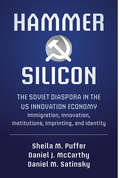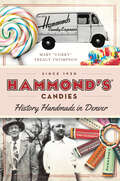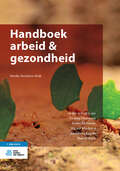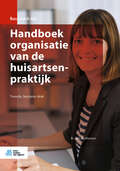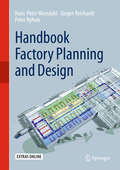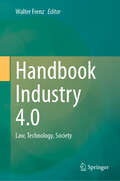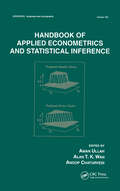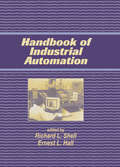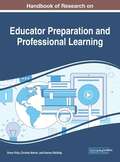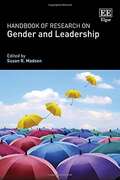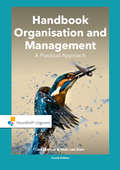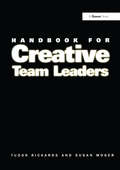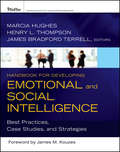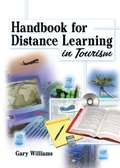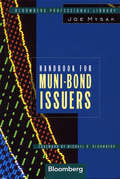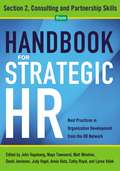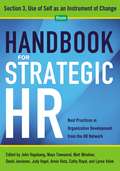- Table View
- List View
Hammer and Silicon: The Soviet Diaspora in the U.S. Innovation Economy — Immigration, Innovation, Institutions, Imprinting, and Identity
by Sheila M. Puffer Daniel J. McCarthy Daniel M. SatinskyThis deeply personal book tells the untold story of the significant contributions of technical professionals from the former Soviet Union to the US innovation economy, particularly in the sectors of software, social media, biotechnology, and medicine. Drawing upon in-depth interviews, it channels the voices and stories of more than 150 professionals who emigrated from 11 of the 15 former Soviet republics between the 1970s and 2015, and who currently work in the innovation hubs of Silicon Valley and Boston/Cambridge. Using the social science theories of institutions, imprinting, and identity, the authors analyze the political, social, economic, and educational forces that have characterized Soviet immigration over the past 40 years, showing how the particularities of the Soviet context may have benefited or challenged interviewees' work and social lives. The resulting mosaic of perspectives provides valuable insight into the impact of immigration on US economic development, specifically in high technology and innovation.
Hammond's Candies: History Handmade in Denver (American Palate Ser.)
by Mary "Corky" ThompsopnA history of the Denver-based candy company. In 1920, Carl T. Hammond founded his company with a commitment to quality. He single-handedly developed recipes, sold candy and handled everything else required to run the small operation. Nearly a century after that humble beginning, Hammond&’s Candies still clings to that original vision, creating prized confections by hand. The Mitchell Sweet, first introduced in the 1930s, is still a top seller, and visitors touring the factory can view the original machinery being used in production. Author Corky Thompson traces the history and growth of this family-owned company from 1920 until its sale at the end of the twentieth century and follows its transition under new ownership to the present time.
Hampton Machine Tool Co.
by David W. Mullins Jr.A bank lending officer must decide whether to extend and increase a loan to a small machine tool company. Case provides sufficient data for preparation of cash budgets and pro forma financial statements in order to analyze the lending officer's problem. Other issues that can be addressed include the impact of stock repurchase, dividends, advanced payments by customers, as well as general sensitivity analysis.
Hamptonshire Express
by Ananth Raman V. G. NarayananPresents a series of problems that face a newspaper publisher, including inventory level, effort level, subsidy for unsold inventory, and commission for sales. Students must make various operational decisions.
Handboek Onderhandelen voor insiders: Hoe onderhandel je op het randje en kom je ermee weg
by Passos Dias AguiarJe krijgt niet wat je verdient… je krijgt wat je onderhandelt! Als je je onderhandelingsvaardigheden wilt verbeteren, is dit boek iets voor jou. Onderhandelingsvaardigheden bepalen sterk het professionele en persoonlijke leven van elk individu. Deze vaardigheden kunnen je toekomstige succes voor een groot deel voorspellen. Mensen met betere onderhandelingsvaardigheden zijn anderen routinematig de baas door superieur intellect, meer kennis en ervaring, en zelfs meer lef. Veel mensen waren ten onrechte van mening dat onderhandelingsvaardigheden slechts van belang zijn voor die paar mensen die op speciale plekken bijeenkomen om deals te sluiten die de meesten van ons niet aangaan. Niets is minder waar: de baas onderhandelt met de medewerker, de man onderhandelt met de vrouw, de leerling onderhandelt met de leraar, de verkoper onderhandelt met de koper en de zoon onderhandelt met zijn moeder. Mensen die denken dat ze niet aan onderhandelingen deelnemen, doen het eigenlijk dagelijks, en ze winnen en verliezen bij elk van die interacties. Helaas hebben maar heel weinig mensen het voordeel gehad dat ze een onderhandelingstraining hebben gedaan. Dit boek neemt die handicap weg: het onthult de geheimen, tactieken en strategieën die worden gebruikt door gehaaide professionele internationale onderhandelaars. Hier is alles te vinden wat je nodig hebt om betere resultaten te behalen bij je persoonlijke en professionele onderhandelingen. Het leest makkelijk weg, dit is een boek dat je er vaak even bij zult pakken. Onderwerpen zijn onder meer: • De drie cruciale onderdelen van elke onderhandeling. • Bronnen van macht bij een onderhandeling. • Onderhandelingsstijl. • Openingstactieken. • Middenspeltactieken • Eindspeltactieken. • Omgaan met agressieve confrontaties. • Telefonisch onderhandelen. • Wat d
Handboek arbeid & gezondheid
by Yvonne Heerkens André Bieleman Harald Miedema Josephine Engels Marcel BalmDit boek helpt professionals om de meest optimale ondersteuning te bieden aan mensen die (weer) aan het werk gaan, of aan het werk willen blijven. Het is met name bedoeld voor zorg-, arbo-, en HR-professionals.In Handboek arbeid & gezondheid staat de relatie tussen arbeid en gezondheid centraal. Daarbij wordt gezondheid breed opgevat – vanuit een holistische visie. Het boek beschrijft arbeidsparticipatie vanuit verschillende perspectieven, en legt uit hoe daarmee om te gaan. Bijvoorbeeld in relatie tot de steeds ouder wordende doelgroep van werkenden, op mensen met chronische aandoeningen, en de speciale situatie van ZZP’ers. Thema’s als wet- en regelgeving, duurzame inzetbaarheid en multidisciplinaire samenwerking komen daarbij ook aan de orde. Daarnaast beschrijft Handboek arbeid & gezondheid wat er nodig is om de organisatie waar het werk plaatsvindt ‘gezond’ te houden. Het beschrijft bijvoorbeeld gedrags- en cultuurveranderingen en aandacht voor een gezonde en veilige werkomgeving. Deze vierde editie van het Handboek arbeid & gezondheid is geheel geactualiseerd. Het sluit naadloos aan bij de recente ontwikkelingen in werk en gezondheid, zoals de gevolgen van de COVID-19-pandemie.
Handboek arbeid & gezondheid: Een Handboek Voor Paramedici En Arboprofessionals
by Yvonne Heerkens André Bieleman Harald Miedema Josephine Engels Marcel BalmDit boek geeft antwoord op de vraag hoe je integratie, inclusieve arbeid, duurzame inzetbaarheid en re-integratie bevordert. Werk is belangrijk voor mensen; werk draagt bij aan zelfstandigheid, zelfrespect en ontplooiing. En met de toenemende vergrijzing en flexibilisering van de arbeidsmarkt is het bevorderen van duurzame arbeidsparticipatie een steeds grotere uitdaging. Hoe pak je dat aan? Deze derde editie van het Handboek Arbeid & Gezondheid is geheel geactualiseerd. Daarnaast is de focus van het boek aangepast. Er is meer aandacht voor de verschillende perspectieven van waaruit je naar arbeidsparticipatie kunt kijken, de grote variëteit aan professionals die in de verschillende contexten van arbeid werkzaam zijn en de wijze waarop zij samenwerken. In het traject van het aan het werk krijgen (inclusie / integratie), aan het werk houden en het weer terugbrengen naar het werk (re-integratie) spelen – naast de werkende zelf - veel professionals een rol, waaronder paramedici, arbeidsdeskundigen, arboverpleegkundigen en toegepast psychologen. Zij vormen samen de doelgroep van dit handboek. Ook andere (arbo)professionals zijn betrokken, zoals bedrijfs- en verzekeringsartsen, HRM-managers en preventiemedewerkers. Het Handboek Arbeid & Gezondheid is onmisbaar voor iedereen in opleiding tot beroepen gericht op het bevorderen van duurzame arbeidsparticipatie. Ook voor alle professionals die al werken in het mooie maar complexe veld arbeid en gezondheid is dit boek een nuttige bron van informatie.
Handboek organisatie van de huisartsenpraktijk (Basiswerk AG)
by B. van AbshovenDit handboek geeft (aanstaande) doktersassistenten handvatten voor het uitvoeren van administratieve en organisatorische werkzaamheden in de huisartsenpraktijk. Zo leer je hoe je een kwaliteitssysteem kunt opzetten en aanpassen en welke vormen van declareren er zijn. Dit is de tweede geheel herziene druk van Handboek organisatie van de huisartsenpraktijk.In deze versie staat meer informatie over ICPC-codering en episodegericht registreren. Bovendien worden er nieuwe onderwerpen besproken, zoals de AVG (Algemene Verordening Gegevensbescherming) en de klachtenwet Wkkgz (Wet kwaliteit, klachten en geschillen zorg). Ook is er veel aandacht voor ketenzorg. Handboek organisatie van de huisartsenpraktijk bestaat uit hoofdstukken die oplopen in complexiteit. Het begint met het beschrijven van alledaagse taken die je als doktersassistent uitoefent. En eindigt met het uitleggen van de achterliggende visies over kwaliteit en veiligheid. Je leest wat procesmatig werken is en wat het inhoudt om protocollair te werken. Het onderwerp ketenzorg vind je in verschillende hoofdstukken, vanuit verschillende invalshoeken terug. Dit handboek levert een belangrijke bijdrage aan deeltaken B1-K1, B1-K3, B1-K4 van het kwalificatiedossier Doktersassistent (01-08-2015).Het boek is toegankelijk dankzij ondersteunende foto’s en dankzij tekeningen van Rosali Dewi Bosma die je laten nadenken over de praktijkorganisatie.Barbara van Abshoven doceerde assistenten in de gezondheidszorg op het ROC Midden Nederland. Momenteel werkt zij als praktijkmanager bij Praktijk Catharijnesingel in Utrecht. Zij is medeauteur van de boeken Voetstappen in de samenleving en Assistent en maatschappij, burgerschap voor AG.
Handbook Factory Planning and Design
by Hans-Peter Wiendahl Peter Nyhuis Jürgen ReichardtThis handbook introduces a methodical approach and pragmatic concept for the planning and design of changeable factories that act in strategic alliances to supply the ever-changing needs of the global market. In the first part, the change drivers of manufacturing enterprises and the resulting new challenges are considered in detail with focus on an appropriate change potential. The second part concerns the design of the production facilities and systems on the factory levels work place, section, building and site under functional, organisational, architectural and strategic aspects keeping in mind the environmental, health and safety aspects including corporate social responsibility. The third part is dedicated to the planning and design method that is based on a synergetic interaction of process and space. The accompanying project management of the planning and construction phase and the facility management for the effective utilization of the built premises close the book. The Authors Prof. em. Dr. -Ing. Dr. mult. h. c. Hans-Peter Wiendahl has been director for 23 years of the Institute of Factory planning and Logistics at the Leibniz University of Hannover in Germany. Prof. Dipl. -Ing. Architekt BDA Jürgen Reichardt is Professor at the Muenster school of architecture and partner of RMA Reichardt - Maas - Associate Architects in Essen Germany. Prof. Dr. -Ing. habil. Peter Nyhuis is Managing Director of the Institute of Factory Planning and Logistics at the Leibniz University of Hannover in Germany.
Handbook Industry 4.0: Law, Technology, Society
by Walter FrenzThe handbook presents an overview of Industry 4.0 and offers solutions for important practical questions. The law and its current challenges regarding data assignment (who owns the data? / EU guidelines), data security, data protection (General Data Protection Regulation), cyberattacks, competition law (right to access vs. monopolists, permissible and prohibited exchanges of information, possible collaborations) is the point of departure. In turn, the book explores peculiarities in specific areas of Industry 4.0 (Internet of Production, mechanical engineering, artificial intelligence, electromobility, autonomous driving, traffic, medical science, construction, energy industry, etc.). The book’s closing section addresses general developments in management, the digital transformation of companies and the world of work, and ethical questions.
Handbook Integrated Care
by Volker Amelung Viktoria Stein Nicholas Goodwin Ran Balicer Ellen Nolte Esther SuterThis handbook shares profound insights into the main principles and concepts of integrated care. It offers a multi-disciplinary perspective with a focus on patient orientation, efficiency, and quality by applying widely recognized management approaches to the field of healthcare. The handbook also highlights international best practices and shows how integrated care can work in various health systems. In the majority of health systems around the world, the delivery of healthcare and social care is characterised by fragmentation and complexity. Consequently, much of the recent international discussion in the fields of health policy and health management has focused on the topic of integrated care. “Integrated” acknowledges the complexity of patients’ needs and aims to meet them by taking into account both health and social care aspects. Changing and improving processes in a coordinated way is at the heart of this approach. The second edition offers new chapters on people-centredness, complexity theories and evaluation methods, additional management tools and a wealth of experiences from different countries and localities. It is essential reading both for health policymakers seeking inspiration for legislation and for practitioners involved in the management of public health services who want to learn from good practice.
Handbook Integrated Care
by Volker Amelung, Viktoria Stein, Nicholas Goodwin, Ran Balicer, Ellen Nolte and Esther SuterThis handbook gives profound insight into the main ideas and concepts of integrated care. It offers a managed care perspective with a focus on patient orientation, efficiency, and quality by applying widely recognized management approaches to the field of health care. The handbook also provides international best practices and shows how integrated care does work throughout various health systems. The delivery of health and social care is characterised by fragmentation and complexity in most health systems throughout the world. Therefore, much of the recent international discussion in the field of health policy and health management has focused on the topic of integrated care. “Integrated” acknowledges the complexity of patients´ needs and aims to meet it by taking into account both health and social care aspects. Changing and improving processes in a coordinated way is at the heart of this approach.
Handbook Of Applied Econometrics And Statistical Inference
by Aman UllahSummarizing developments and techniques in the field, this reference covers sample surveys, nonparametric analysis, hypothesis testing, time series analysis, Bayesian inference, and distribution theory for applications in statistics, economics, medicine, biology, engineering, sociology, psychology, and information technology. It supplies a geometric proof of an extended Gauss-Markov theorem, approaches for the design and implementation of sample surveys, advances in the theory of Neyman's smooth test, and methods for pre-test and biased estimation. It includes discussions ofsample size requirements for estimation in SUR models, innovative developments in nonparametric models, and more.
Handbook Of Industrial Automation
by Richard ShellSupplies the most essential concepts and methods necessary to capitalize on the innovations of industrial automation, including mathematical fundamentals, ergonometrics, industrial robotics, government safety regulations, and economic analyses.
Handbook Of Multicultural Assessment: Clinical, Psychological, And Educational Applications
by Joseph G. Ponterotto Lisa A. SuzukiHandbook of Multicultural Assessment offers the most comprehensive text on testing of racial and ethnic minorities in the United States. This thoroughly revised and updated edition includes the most current and state-of-the-art assessment information in a variety of psychological and educational domains. The book highlights new and innovative testing practices and expands the populations of interest to include recent immigrants and refugees. It also includes ways to overcome barriers in the assessment process as well as forensic assessment. This important resource offers an instructional text for conducting culturally competent psychological assessment for clinicians, educators, and researchers.
Handbook Of Research On Educator Preparation And Professional Learning
by Drew Polly Christie Martin Kenan DikilitaThe current climate in education environments necessitates the collaboration on and sharing of research done by teacher educators and professional developers. In an era of high-stakes assessment driven by international tests, professionals are looking for research-based or evidence-based initiatives and approaches to enhance teacher learning, which will in turn impact student learning. The Handbook of Research on Educator Preparation and Professional Learning is a critical scholarly publication that examines pedagogy for educator preparation and growth for classroom expertise. This book features a wide array of topics such as online environments, project-based learning, and urban education. This book is ideal for educators, administrators, professional developers, academicians, policymakers, and researchers.
Handbook Of Research On Gender And Leadership (Research Handbooks In Business And Management Series)
by Susan R. MadsenAlthough some progress has been made in recent decades in getting women into top positions in government, business and education, there are on-going, persisting challenges with efforts to improve the opportunities for women in leadership. The Handbook of Research on Gender and Leadership comprises the latest research from the world's foremost scholars on women and leadership, exposing problems and offering both theoretical and practical solutions on how to best strengthen the impact of women around the world. The Handbook provides a brief overview of the current state of women in global leadership, explores theories (both established and emerging) focused specifically on women, and examines with both theoretical and empirical research some of the factors that influence women's motivations to lead. The authors delineate some of the most persistent barriers to women's leadership success and conclude with the latest research findings on how to best develop women leaders to improve their status worldwide. Handbook of Research on Gender and Leadership will appeal to scholars and advanced students in leadership and entrepreneurship. It will be essential reading for leadership coaches, practitioners and business people, particularly those who facilitate leadership programs for women.
Handbook Organisation and Management: A Practical Approach (Routledge-Noordhoff International Editions)
by Jos Marcus Nick van DamA hands-on introduction to the fields of business and management, this comprehensive text unveils the theories behind management and organization via a practice-led, international approach. In this fourth edition, the book expands with six new chapters on digital business transformation, internationalization, corporate social responsibility, the future of work, human resource management, and culture. In addition, the book contains new, topical practical examples, and features a fully modernized layout. This comprehensive, practice-led text will be valuable for students of business, management and organisation globally. A companion website offers students multiple choice questions, practical cases, and assignments, whilst instructors can assess exams, cases, and college sheets.
Handbook for Creative Team Leaders
by Susan Moger Tudor RickardsEvery worthwhile organization strives continuously to improve. What the authors of this groundbreaking book offer is nothing less than a system for achieving peak performance. As a result of their work with more than 2000 teams, in some 40 countries across the globe, the authors identified the 7 factors that distinguish what they call ’dream teams’ and on that basis they developed the structured approach described in the Handbook. Part I sets out the principles that underlie team performance. Part II shows how to train teams to become more creative. Finally, in Part III, the authors demonstrate their ideas in action with real-life examples from a wide variety of organizational settings. They emphasize throughout the role of leadership in stimulating creativity and innovation, and they explain how to inject new dynamism into existing organizational systems and practices. Anyone involved in teamworking would profit from a close study of the Handbook. It will be especially valuable to team leaders and facilitators, to project managers and to HRD practitioners and consultants.
Handbook for Developing Emotional and Social Intelligence
by Henry L. Thompson James Bradford Terrell Marcia HughesHandbook for Developing Emotional and Social Intelligence is an authoritative collection of practical content--best practices, case studies, and tools--that showcases the application and development of emotional and social intelligence in the workplace. The authors are some of the best-known experts in the field and the book includes practitioners, academics and thought-leaders that contributed to this rich collection of knowledge and solutions that will appeal to anyone involved in developing leaders and teams. The handbook features topics such as leadership, recruitment, conflict resolution, team development, and stress management.
Handbook for Distance Learning in Tourism
by Kaye Sung ChonDeliver quality instruction to your students-on-campus or offThe Handbook for Distance Learning in Tourism is a practical, down-to-earth guide to developing and using print-based and Internet-based flexible learning resources for courses where students rarely, if ever, attend on-campus classes. Whether you&’re a teacher who needs to develop course notes into a flexible learning package, a Web site, or both, or you just want information about how to teach in a flexible environment, the book will provide the help you need-in language you can understand. Designed to guide you through the completion of a project-or a semester-this hands-on book offers strategies, suggestions, hints, and examples, and includes a hotel and tourism case study that illustrates effective concepts and strategies.Written by Gary Williams, co-editor of The Internet and Travel and Tourism Education (Haworth), this unique book will help you develop print-based and Internet-based learning resources instead of focusing only on one or the other, breaking down the barriers placed between learning environments. The strategies presented are timeless, with no comparisons of specific commercial or noncommercial products to become outdated and no Web site addresses to become useless. The book makes extensive use of tables, graphics, and illustrations and has its own Web site that&’s regularly updated, listing online resources arranged on a chapter-by-chapter basis.The Handbook for Distance Learning in Tourism examines: the roles and characteristics of a project manager developing and buying resources considerations before committing to a project maximizing project ownership ensuring quality content educational design guidelines media foundations production, design, and maintenance of print resources developing and using Web sites computer-mediated contact course management systems (CMS) and much more!The Handbook for Distance Learning in Tourism is an invaluable guidebook for educators working in the field of hotel and tourism management as well as academics, project managers, and educational designers who are interested in flexible learning developments.
Handbook for Muni-Bond Issuers (Bloomberg Financial #18)
by Joe MysakFrom Bloomberg, the authority on municipal bond valuation, this is the first book to give issuers (municipalities and their officers, attorneys, and other advisers) step-by-step tips on (1) lowering the cost of financing and (2) how to do it right and avoid trouble--with the press, with the market, with constituents, and with the Securities and Exchange Commission. With an insider's perspective, Joe Mysak debunks the myths and reveals thepractical realities of today's municipal bond market. Fresh and clearly written, this excellent primer on issuing municipal bonds is a key to the market that no participant should be without.
Handbook for Museums (The\heritage: Care - Preservation - Management Ser.)
by David Dean Gary EdsonHandbook for Museums is the definitive guide of need-to-know information essential for working in the museum world. Presenting a field-tested guide to best practice, the Handbook is formed around a commitment to professionalism in museum practice. The sections provide information on management, security, conservation and education. Including technical notes and international reading lists too, Handbook for Museusms is an excellent manual for managing and training.
Handbook for Strategic HR - Section 2: Consulting and Partnership Skills
by John Vogelsang Maya Townsend Matt Minahan David Jamieson Judy Vogel Annie Viets Cathy Royal Lynne Valek Od NetworkThe role of the HR professional has shifted from personnel administrator to business adviser, which includes consulting and partnering with the organization’s leadership and other service providers. This section will help you learn what core skills are needed for consulting; how to develop partner relationships to support innovation and change; how to work with clients in a consultative mode; and how to deal with the challenges of being an internal consultant.
Handbook for Strategic HR - Section 3: Use of Self as an Instrument of Change
by John Vogelsang Maya Townsend Matt Minahan David Jamieson Judy Vogel Annie Viets Cathy Royal Lynne Valek Od Network“Use of self” is what Organizational Development practitioners call the complex set of awareness and behaviors that make it possible to be genuinely helpful to others. Effective use of self is essential for influencing change in an organization. This section will help you understand how your assumptions influence your behavior and your perception of others; how to counter covert dynamics in the workplace that undermine productivity; how to encourage ethical leadership; how to foster inclusion; and how to continually learn about greater self-awareness and better working relationships with colleagues.
